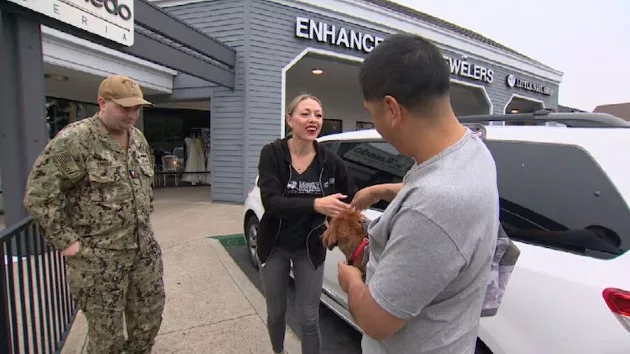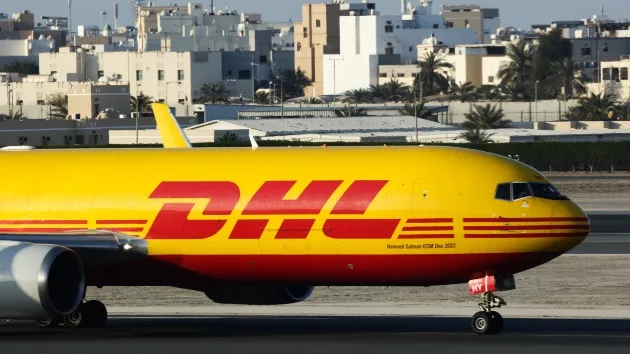
(NEW YORK) — A growing number of pet owners in the U.S. are turning to Mexico to access more affordable medical care for their pets.
Miguel Lazcano of New York City, a pet owner who considers his three dogs to be his family, was facing a heart-wrenching situation. One of his dogs, a long-haired dachshund named Henry, desperately needed dental care.
“We noticed some of his teeth were loose and his breath was getting worse,” Lazcano said. “They mentioned there was at least four extractions and the cost on the high end was around $5,000. And on the low end, was around $3,500.”
Without the safety net of pet insurance, Lazcano had already spent a significant amount, $700, on Henry’s bloodwork. Faced with the prospect of pricey dental care, Lazcano decided to explore more cost-effective veterinary treatment in Mexico.
He discovered MexiVet Express, a pet courier service that would take Henry to Tijuana, Mexico, for veterinary care. It’s part of a growing pet medical tourism industry across the southern border.
Anna Ginsky, the owner of MexiVet Express, got the idea to start the company after taking her pooch to Mexico for dental care. She regularly visits Tijuana, just 20 minutes from her California home, to save money on her own medical needs.
Ginsky said she saved $1,600 on her dog’s veterinary care in Mexico.
“Mexican vets are definitely targeting U.S. pet owners to become their clients,” Ginsky said. “They’re making announcements in English. They’re advertising more on the internet.”
Her clients travel from all over the United States. Ginsky and her team accompany the pets while their owners remain stateside.
Most of the vet visits are completed within a day. The most popular services include dental care and simple surgeries. The Mexican veterinarians Ginsky works with also offer follow-up appointments, wellness exams and even chemotherapy treatment.
“It makes me feel really fulfilled to be able to offer a service like this,” Ginsky said. “We have people that cry when they learn what our prices are going to be and how affordable it’s going to be for them.”
After traveling almost 3,000 miles, Henry arrived for his first medical appointment in Mexico. Henry underwent an echocardiogram to make sure he can tolerate anesthesia before moving on to a second clinic for his teeth cleaning and extractions.
Ginsky called Lazcano with regular updates on his dachshund. She emphasized the importance of keeping pet owners informed throughout the day, regardless of whether they are new clients or have used her services before.
“Everybody loves their pet just the same. And they want to make sure that their pet’s doing OK,” she said.
Ronald Richards, the owner of Vet Playas Clinic where Henry had his dental work done, estimates that 80% of his clients are from the U.S. He says one reason veterinary prices are lower in Mexico is that labor costs less.
“The doctors just don’t make as much money as they do in the United States,” Richards said. “And then you have the cost of your building, which is less because the real estate is less. We don’t have medical malpractice insurance or anything like that. So here in Mexico, it’s really kind of buyer beware in regards to when you go to somebody’s clinic for service.”
Experts advise U.S. pet owners to be aware of differing veterinary standards in other countries. California-based veterinary surgeon Courtney Campbell also warned that taking pets across the border, or what is known as “pet medical tourism,” raises some important concerns.
“There are different accreditation rules for each veterinary school in other countries,” Dr. Campbell said. “Second is the stress on the pet itself, right? The idea that we will take a pet who may be ill, bring them over the border, receive treatment. They get transported again over the border and then back to the home. And if your pet is experiencing complications, you may have hidden costs because now you have to extend your stay at that particular location.”
Despite the risks, Lazcano feels comfortable with his decision and confident in the veterinarian care Henry received.
“I’ve seen instances where, you know, humans go to Mexico for their own dental work, surgeries,” Lazcano said. “Just cause it’s things that are at human grade and I don’t see why Mexico would be any different.”
Henry returned home after his dental surgery, and Lazcano was pleased with the results. He said Henry’s breath is fresh, and the dog has fully recovered.
Lazcano spent about a third of what he would have paid a vet in New York. He’s now considering taking his two other dogs for treatment in Mexico.
Copyright © 2024, ABC Audio. All rights reserved.








